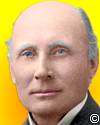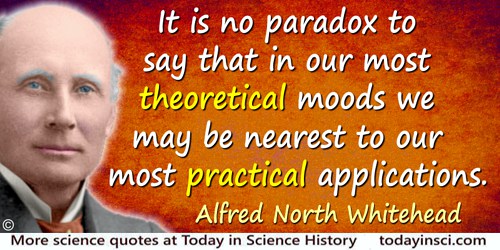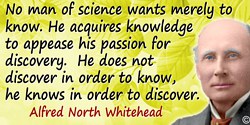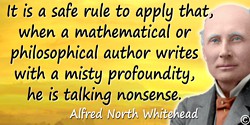 (source)
(source)
|
Alfred North Whitehead
(15 Feb 1861 - 30 Dec 1947)
English mathematician and philosopher who worked in logic, physics, and later in his life spent more time on the philosophy of science and metaphysics. He worked with Bertrand Russell on Principia Mathematica which shows that logic underlies all mathematics.
|
Alfred North Whitehead Quotes on Application (11 quotes)
>> Click for 135 Science Quotes by Alfred North Whitehead
>> Click for Alfred North Whitehead Quotes on | Civilization | Discovery | Education | Error | Fact | Idea | Imagination | Importance | Invention | Knowledge | Learning | Life | Literature | Logic | Mathematics | Mind | Particular | Philosophy | Progress | Science | Thought | Truth |
>> Click for 135 Science Quotes by Alfred North Whitehead
>> Click for Alfred North Whitehead Quotes on | Civilization | Discovery | Education | Error | Fact | Idea | Imagination | Importance | Invention | Knowledge | Learning | Life | Literature | Logic | Mathematics | Mind | Particular | Philosophy | Progress | Science | Thought | Truth |
Definition of Mathematics.—It has now become apparent that the traditional field of mathematics in the province of discrete and continuous number can only be separated from the general abstract theory of classes and relations by a wavering and indeterminate line. Of course a discussion as to the mere application of a word easily degenerates into the most fruitless logomachy. It is open to any one to use any word in any sense. But on the assumption that “mathematics” is to denote a science well marked out by its subject matter and its methods from other topics of thought, and that at least it is to include all topics habitually assigned to it, there is now no option but to employ “mathematics” in the general sense of the “science concerned with the logical deduction of consequences from the general premisses of all reasoning.”
— Alfred North Whitehead
In article 'Mathematics', Encyclopedia Britannica (1911, 11th ed.), Vol. 17, 880. In the 2006 DVD edition of the encyclopedia, the definition of mathematics is given as “The science of structure, order, and relation that has evolved from elemental practices of counting, measuring, and describing the shapes of objects.” [Premiss is a variant form of “premise”. —Webmaster]
During the school period the student has been mentally bending over his desk; at the University he should stand up and look around. For this reason it is fatal if the first year at the University be frittered away in going over the old work in the old spirit. At school the boy painfully rises from the particular towards glimpses at general ideas; at the University he should start from general ideas and study their applications to concrete cases.
— Alfred North Whitehead
In 'The Rhythm of Education', The Aims of Education and Other Essays (1929), 26.
It is no paradox to say that in our most theoretical moods we may be nearest to our most practical applications.
— Alfred North Whitehead
In Introduction to Mathematics, 100.
MATHEMATICS … the general term for the various applications of mathematical thought, the traditional field of which is number and quantity. It has been usual to define mathematics as “the science of discrete and continuous magnitude.”
— Alfred North Whitehead
Opening statement in article 'Mathematics', Encyclopedia Britannica (1911, 11th ed.), Vol. 17, 878. Whitehead then indicated this was an inadequate definition, which he then discussed at length and tried to give an improved definition later in the article. See the quote beginning “Definition of Mathematics…” on the Alfred North Whitehead Quotes page on this website.
The anxious precision of modern mathematics is necessary for accuracy, … it is necessary for research. It makes for clearness of thought and for fertility in trying new combinations of ideas. When the initial statements are vague and slipshod, at every subsequent stage of thought, common sense has to step in to limit applications and to explain meanings. Now in creative thought common sense is a bad master. Its sole criterion for judgment is that the new ideas shall look like the old ones, in other words it can only act by suppressing originality.
— Alfred North Whitehead
In Introduction to Mathematics (1911), 157.
The first acquaintance which most people have with mathematics is through arithmetic. That two and two make four is usually taken as the type of a simple mathematical proposition which everyone will have heard of. … The first noticeable fact about arithmetic is that it applies to everything, to tastes and to sounds, to apples and to angels, to the ideas of the mind and to the bones of the body.
— Alfred North Whitehead
In An Introduction to Mathematics (1911), 9.
The momentous laws of induction between currents and between currents and magnets were discovered by Michael Faraday in 1831-32. Faraday was asked: “What is the use of this discovery?” He answered: “What is the use of a child—it grows to be a man.” Faraday’s child has grown to be a man and is now the basis of all the modern applications of electricity.
— Alfred North Whitehead
In An Introduction to Mathematics (1911), 34-35.
The point of mathematics is that in it we have always got rid of the particular instance, and even of any particular sorts of entities. So that for example, no mathematical truths apply merely to fish, or merely to stones, or merely to colours. So long as you are dealing with pure mathematics, you are in the realm of complete and absolute abstraction. … Mathematics is thought moving in the sphere of complete abstraction from any particular instance of what it is talking about.
— Alfred North Whitehead
In Science and the Modern World: Lowell Lectures, 1925 (1925), 31.
The study of mathematics is apt to commence in disappointment. The important applications of the science, the theoretical interest of its ideas, and the logical rigour of its methods all generate the expectation of a speedy introduction to processes of interest. We are told that by its aid the stars are weighed and the billions of molecules in a drop of water are counted. Yet, like the ghost of Hamlet's father, this great science eludes the efforts of our mental weapons to grasp it.
— Alfred North Whitehead
Opening to An Introduction to Mathematics (1911), 7.
There is no more common error than to assume that, because prolonged and accurate mathematical calculations have been made, the application of the result to some fact of nature is absolutely certain.
— Alfred North Whitehead
In An Introduction to Mathematics (1911), 27.
To come very near to a true theory, and to grasp its precise application, are two different things, as the history of science teaches us. Everything of importance has been said before by someone who did not discover it.
— Alfred North Whitehead
In The Organisation of Thought (1917), 127. Collected in The Interpretation of Science: Selected Essays (1961), 33.
See also:
- 15 Feb - short biography, births, deaths and events on date of Whitehead's birth.
- Science and the Modern World, by Alfred North Whitehead. - book suggestion.





 In science it often happens that scientists say, 'You know that's a really good argument; my position is mistaken,' and then they would actually change their minds and you never hear that old view from them again. They really do it. It doesn't happen as often as it should, because scientists are human and change is sometimes painful. But it happens every day. I cannot recall the last time something like that happened in politics or religion.
(1987) --
In science it often happens that scientists say, 'You know that's a really good argument; my position is mistaken,' and then they would actually change their minds and you never hear that old view from them again. They really do it. It doesn't happen as often as it should, because scientists are human and change is sometimes painful. But it happens every day. I cannot recall the last time something like that happened in politics or religion.
(1987) -- 


